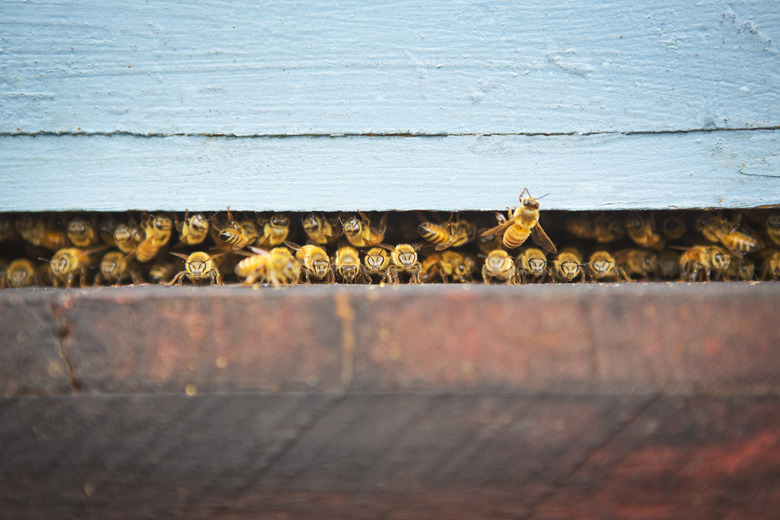Our Bees Are Still At Risk — Here's How You Can Help Them
If you've been following environmental science news over the past few years, chances are you've heard of colony collapse disorder: A phenomenon where some (or most) of the worker bees disappear from their colony.
The worker bees can seem to disappear out of thin air. Farmers don't report scads of dead bees surrounding the colony and stranger still, the hives themselves still have plenty of honey and pollen. But the loss of worker bees means the colony can no longer sustain itself and as the name suggests, collapses.
According to the Environmental Protection Agency, winter bee loss, a sign of the health of bee colonies, peaked in the aughts. Bee colony loss has halved, from nearly 60 percent in 2008 to just over 31 percent in 2013.
But environmental factors still pose a threat to bees. You can learn more about the challenges still facing bees, how they could affect the food supply and how you can help.
Why Worry About Bees?
Why Worry About Bees?
Before delving into the challenges facing bee populations, let's address the question that might be on your mind: Why worry so much about bees?
On top of the inherent value in protecting ecosystems, bees are incredibly important for health. Their role as pollinators means they play a crucial role in plant reproduction. And some of your favorite foods such as avocado, watermelons, apples, strawberries and many more, rely on bees for pollination. Losing bees would mean grocery stores would look much emptier. And what's summer without strawberries?
And, of course, because plants naturally help keep air clean (thanks, photosynthesis!), pollinators that support plant growth promote healthy air, too.
Why Are Bees at Risk?
Why Are Bees at Risk?
One of the risks to bees involves pesticide use, especially a class of pesticides called neonicotinoids. These pesticides are very water-soluble, so they can easily leach into the water system and spread throughout the ecosystem. Over time, low-level contamination could hurt pollinators enough to alter their behavior or increase their mortality. However, conflicting studies make it hard to pinpoint how much these pesticides alone harm honey bees.
Another risk: habitat loss. Bees need flowering plants to collect pollen. So development that turns, for example, a fallow field into a parking lot means fewer flowering plants for the bees to visit.
There are other factors, as well. Invasive species, like the varroa mite, harm honey bee populations. And certain microbes, like Israeli Acute Paralysis virus, threaten bees as well.
How You Can Support Your Local Bees
How You Can Support Your Local Bees
The easiest way to support pollinator species like bees is to start a garden. The Ohio State University College of Food, Agricultural and Environmental Sciences recommends planting an array of trees, shrubs and other plants that bloom throughout the season, so bees can always count on your yard to have some kind of food.
Bees also love certain weeds, like dandelion. Consider not mowing them down, and ask your local representative about creating a "pollinator" section of your local park, where bee-friendly weeds can grow freely.
Finally, consider reducing or eliminating your own pesticide use, and avoid pesticides containing neonicotinoids. Your garden might not look picture perfect, but your local bees will thank you!
References
- Environmental Protection Agency: Colony Collapse Disorder
- Harvard School of Public Health: Study strengthens link between neonicotinoids and collapse of honey bee colonies
- Ohio State University College of Food, Agricultural and Environmental Sciences: Pollinator Quick Guide: What You Can Do to Help Honey Bees
Cite This Article
MLA
Tremblay, Sylvie. "Our Bees Are Still At Risk — Here's How You Can Help Them" sciencing.com, https://www.sciencing.com/our-bees-are-still-at-risk-heres-how-you-can-help-them-13711549/. 25 June 2018.
APA
Tremblay, Sylvie. (2018, June 25). Our Bees Are Still At Risk — Here's How You Can Help Them. sciencing.com. Retrieved from https://www.sciencing.com/our-bees-are-still-at-risk-heres-how-you-can-help-them-13711549/
Chicago
Tremblay, Sylvie. Our Bees Are Still At Risk — Here's How You Can Help Them last modified August 30, 2022. https://www.sciencing.com/our-bees-are-still-at-risk-heres-how-you-can-help-them-13711549/
